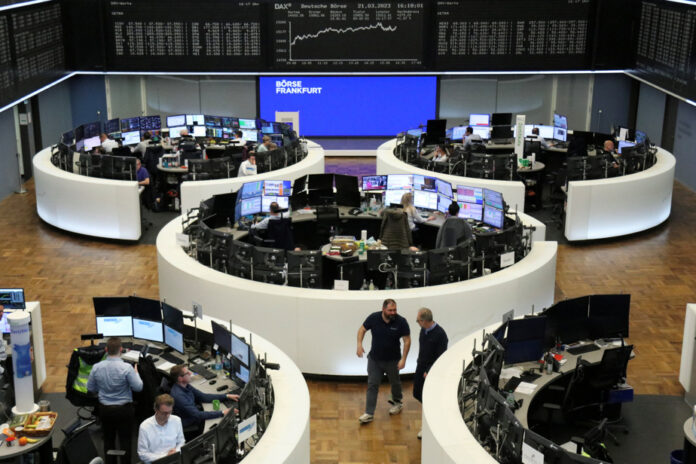(Paris) The world stock markets are patiently patient on Wednesday, before the announcement of the decision of the American central bank, whose meeting is being held in a context undermined by the banking shock.
The New York Stock Exchange opened around breakeven. By 9:55 a.m. EST, the Dow Jones was down 0.09%, the S
European markets, which recovered nearly 3% in two sessions, rose moderately: Paris gained 0.45%, London 0.31%, Frankfurt 0.52% and Milan 0.39%.
The banking sector of the broader European Eurostoxx 600 index rose sharply by 1.08%, bringing its rebound over the week to 6.2%.
The stock exchanges in Tokyo, Shanghai and Hong Kong have also recovered.
Investors are suspended at the conclusion of the two-day meeting of the monetary policy committee of the United States Central Bank (Fed).
The Fed must engage in “ a balancing act ” according to John Plassard, investment specialist at Mirabaud.
“ The risk of recession in the United States in the second half increased after the banking stress and the Federal Reserve will necessarily take this into account in its management of monetary policy ”, underlines Alexandre Baradez, analyst of IG France.
The fears around American regional banks have not completely dissipated. First Republic, which took off 30% on Tuesday thanks to the lifelines of the authorities, was down 4.12% around 9:55 a.m. (Eastern time).
The Californian establishment Pacwest fell by 8.85% after indicating that it had recorded the withdrawal of 20% of its customers’ deposits since the beginning of the year and having given up launching a new capital increase, according to the agency. Bloomberg Financial Information.
The majority of analysts believe that the institution should still raise its key rates by 0.25 percentage points, to bring them to just below 5%, as at the last meeting. Earlier in the month, they thought the rise was going to be double.
In a sign that the fight against rising prices in the Western world is far from over, inflation has risen to 10.4% year on year in the United Kingdom, against 10.1% in January when economists thought that the rhythm was going to slow down slightly.
“Rising alcohol prices in pubs and restaurants” largely contributed to this surprise rebound, as did “food and non-alcoholic beverages, which have climbed at the fastest rate in more than 45 years”, underlines Grant Fitzner, economist for the British Office for National Statistics, on the eve of a decision by the Bank of England on its interest rates.
On the bond market, the rates for government bonds in Europe recovered again: the German 10-year bond, the benchmark maturity, stood at 2.36%, the highest for a week, against 2.29% Tuesday at close. US rates were stable at the same time.
Nike’s quarterly sales were driven by demand for its sports shoes, but the group’s margins were constrained by remaining high inventories, rising production costs and transport prices. Its stock was down 1.64% in New York.
Oil was blowing after rebounding from its lows since December 2021 in the last two sessions. The barrel of Brent from the North Sea for May delivery was stable at 75.28 dollars, while the barrel of American WTI at the same maturity, which is the first day of use as a reference contract, yielded 0.20% at $69.61 around 9:55 a.m. EST.
The euro advanced 0.09% against the dollar to 1.0778 dollars, while the pound strengthened by 0.15% to 1.2236 dollars, after British inflation suggesting further monetary tightening.
Bitcoin was fairly stable at $28,360.















